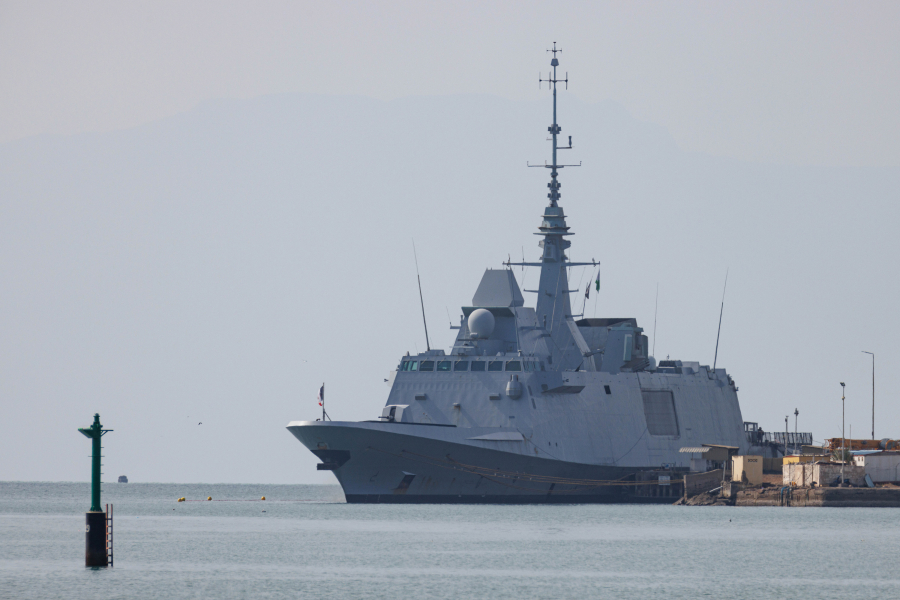A far-reaching plan to channel Europe-Asia trade through the Middle East is at risk of stalling before it even gets started.
The Israel-Hamas war has halted progress on what’s known as the India-Middle East-Europe Economic Corridor — a project touted last year by Washington and key allies that envisages building new rail links across the Arabian peninsula. As Houthi attacks disrupt Red Sea shipping and turmoil spreads across the region, IMEC is effectively on ice.
That’s a setback for U.S. strategy, because the plan served multiple purposes – to counter China’s Belt and Road infrastructure program, build influence in the so-called “Global South,” and speed up the hoped-for rapprochement between Israel and Saudi Arabia.
“This is a project that made Iran, China, Russia, even Turkey nervous,” said Romana Vlahutin, the former European Union special envoy for connectivity who’s now a distinguished fellow at the German Marshall Fund. “Maybe that is the best proof of its strategic importance.”
Asked about the timeline for the project, a person familiar with the plans said the outbreak of violence in the Middle East has diverted attention away from discussions on IMEC.
In their contest with China for global influence, the U.S. and Europe have struggled to win support in the developing world. Many emerging nations stayed neutral in the face of Russia’s invasion of Ukraine, and backed an immediate end to Israel’s war in Gaza – declining to follow the American line in both cases.
To bolster their leverage, Group of Seven countries are engaging in what some have dubbed a battle of offers – holding out the prospect of tangible infrastructure projects, rather than appealing to shared values.
IMEC was one of the most ambitious. It was cemented at September’s Group of 20 summit, in a three-way handshake between an unlikely triumvirate: U.S. President Joe Biden, Indian Prime Minister Narendra Modi and Saudi Crown Prince Mohammed bin Salman.
The announcement caught many by surprise. Its centerpiece was a new rail route that would link up with existing maritime and truck transportation networks. Biden called it a “game-changing regional investment.”
Analysts also saw the project as a step toward the administration’s real prize: a pact between Israel and Saudi Arabia.
In Davos last week, National Security Advisor Jake Sullivan said the U.S. approach had been “to work towards a package deal that involved normalization between Israel and key Arab states” as well as “a political horizon” for Palestinians. “That was our goal before Oct. 7,” he said.
Hamas’s attack that day triggered Israel’s war in Gaza — which threatens to spill over on multiple fronts, drawing in Iran-backed Hamas allies such as the Houthis and Hezbollah, as well as the U.S.
All this chaos put an abrupt stop to IMEC. The 3,000-mile route runs through countries now on high alert in case they get caught up in the war. Arab public outrage over the civilian death toll in Gaza means governments of IMEC participants like the United Arab Emirates must tread carefully. Saudi Arabia is ruling out any deal with Israel unless there’s a clear path to a Palestinian state.
Of course, IMEC – a project that fitted neatly into American geopolitical rhetoric but remained light on detail — might have foundered even absent a Middle East war.
“While IMEC certainly looked promising on paper, complex regional dynamics were always going to pose implementation challenges,” said Craig Singleton, a senior fellow at the Foundation for Defense of Democracies, a Washington think tank.
Among the signers of last September’s agreement, there’s clear impetus to get the deal restarted if regional tensions ease.
The “strategic rationale remains unwavering, even stronger,” said Mohammed Soliman, director of the strategic technologies and cyber security program at the Middle East Institute in Washington. “Participating countries remain deeply committed to this vision.”
Biden has referred to the “historic” project on several occasions since the G-20 summit – including citing it as a way of countering Belt and Road. “We’re going to compete on that,” the president told a White House press conference in October. “We’re doing it a different way.”
Biden is gearing up for a November election that will likely be a rematch pitting him against Donald Trump. With both U.S. parties committed to a hard line against China, the Biden administration has been seeking to set its foreign policy apart – including by emphasizing its readiness to work with allies on multilateral projects.
Architects of the IMEC plan acknowledge that there’s an urgency to such efforts right now, amid rapid shifts in the global order led by the U.S. since World War II.
Asked about those changes in Davos, Sullivan cited the importance of “giving greater voice to countries that did not have that voice back after 1945, but deserve it today.”
Vlahutin, the former EU policy maker, said that with Western capital now seeking alternatives to China for investment, “the countries in the so-called Global South, and in particular India, have a massive chance.”
Still, in some respects the U.S. and its allies are playing catch-up with China, which launched Belt and Road more than a decade ago.
“Washington is seriously struggling to counter China’s grand economic vision,” Singleton said. “The collapse of IMEC is a stark reminder that grand strategic plans often stumble in the face of harsh geopolitical realities.”



